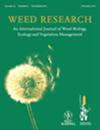Improved control of Taraxacum officinale with 2,4‐D in the field from ammonium sulphate additions
IF 2.4
3区 农林科学
Q2 AGRONOMY
引用次数: 0
Abstract
Taraxacum officinale G.H. Weber ex Wiggers (dandelion) is a common weed of cool‐season turfgrass with 2,4‐D as the most commonly used herbicide for its control. Hard water is known to antagonise 2,4‐D dimethylamine herbicide efficacy in greenhouse studies, and this antagonism is mitigated by adding the water conditioning agent ammonium sulphate (AMS) to spray mixtures. As greenhouse herbicide efficacy trials do not always provide similar control to field studies, this experiment was undertaken to determine how hard water and AMS influences 2,4‐D dimethylamine control of T. officinale in established lawns. Hard water was prepared to achieve 0, 275, 450 and 675 mg CaCO3 L−1. The 2,4‐D was applied at each hardness level with and without AMS at 20 g L−1 in eight separate field trials across three sites and two seasons. Regardless of water hardness level, 2,4‐D treatments with AMS added reduced T. officinale cover at 52 weeks after application (WAA) compared to those without AMS. Similarly, fewer T. officinale plants were recorded when adding AMS to 2,4‐D. Taraxacum officinale cover at 52 WAA was higher when applied in water with a hardness of 450 mg CaCO3 L−1 or more compared to applications in distilled water (0 mg CaCO3 L−1). When hard water antagonism occurred, the addition of AMS to the spray mixture reduced the antagonism. Based on this field experiment and consistent with greenhouse experiments, applicators should mix AMS at 20 g L−1 when applying 2,4‐D dimethylamine, especially in hard water.硫酸铵添加物改善了田间 2,4-D 对蒲公英的防治效果
蒲公英(Taraxacum officinale G.H. Weber ex Wiggers)是冷季型草坪中常见的杂草,2,4-D 是最常用的除草剂。在温室研究中,已知硬水会拮抗 2,4-D 二甲胺除草剂的药效,在喷雾混合物中加入水调节剂硫酸铵(AMS)可减轻这种拮抗作用。由于温室除草剂药效试验并不总能提供与田间研究类似的控制效果,因此本实验旨在确定硬水和 AMS 如何影响 2,4-D 二甲胺对成熟草坪中欧鼠李的控制效果。硬水的浓度分别为 0、275、450 和 675 毫克 CaCO3 L-1。在三个地点和两个季节的八个独立田间试验中,在每个硬度水平下施用 2,4-D,同时施用或不施用 20 g L-1 的 AMS。与不添加 AMS 的处理相比,无论水的硬度如何,添加 AMS 的 2,4-D 处理在施用后 52 周(WAA)都会降低欧鼠李的覆盖率。同样,在 2,4-D 中添加 AMS 后,欧鼠李植株数量也减少了。与使用蒸馏水(0 毫克 CaCO3 L-1)相比,在硬度为 450 毫克 CaCO3 L-1 或更高的水中施用蒲公英,在施用后 52 WAA 的覆盖率更高。当出现硬水拮抗作用时,在喷雾混合物中添加 AMS 可减少拮抗作用。根据这项田间试验以及温室试验的结果,施药者在施用 2,4-D 二甲胺时,尤其是在硬水中施用时,应将 AMS 混合在 20 g L-1 的浓度中。
本文章由计算机程序翻译,如有差异,请以英文原文为准。
求助全文
约1分钟内获得全文
求助全文
来源期刊

Weed Research
农林科学-农艺学
CiteScore
4.30
自引率
0.00%
发文量
41
审稿时长
12-24 weeks
期刊介绍:
Weed Research is an international peer-reviewed journal that publishes topical and innovative papers on weed science, in the English language. Its aim is to publish the best weed science from around the globe and to be the journal of choice for weed science researchers. It is the official journal of the European Weed Research Society. Papers are taken on all aspects of weeds, defined as plants that impact adversely on economic, aesthetic or environmental aspects of any system. Topics include, amongst others, weed biology and control, herbicides, invasive plant species in all environments, population and spatial biology, modelling, genetics, biodiversity and parasitic plants. The journal welcomes submissions on work carried out in any part of the world.
 求助内容:
求助内容: 应助结果提醒方式:
应助结果提醒方式:


